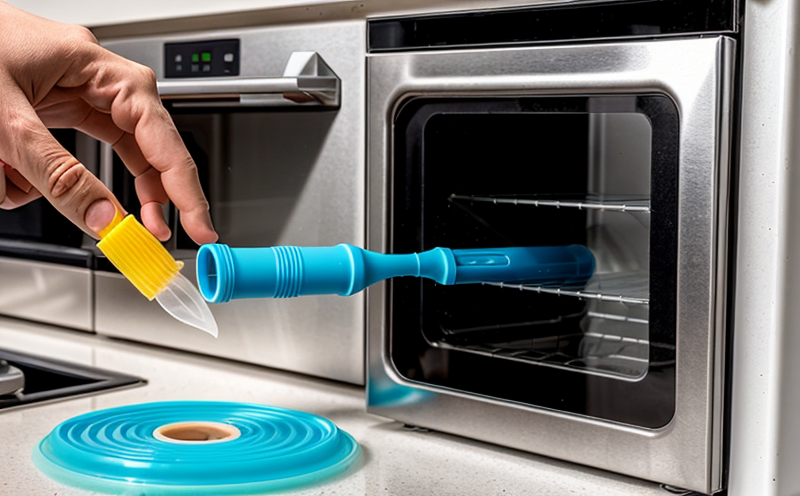ISO 1183 Density Measurement Testing of Household Plastics
The ISO 1183 standard specifies a method to determine the density of thermoplastics using an immersion-type apparatus. This test is particularly relevant for household plastics, which are widely used in everyday items like food containers, toys, and packaging materials.
Household plastics are characterized by their versatility and safety standards, making accurate density measurement crucial for quality assurance and compliance. The ISO 1183 method provides a standardized approach to ensure that the plastic parts or components meet the required specifications. This is especially important in sectors like consumer goods where trustworthiness of materials can impact public health.
The test involves immersing a sample in a liquid, typically water or another appropriate solvent, and determining its volume by measuring the displacement of the liquid. The density is then calculated using the formula: Density = Mass / Volume. This method ensures that the plastic parts used in household items are consistent with industry standards.
For accurate results, it's essential to follow all steps meticulously. Specimen preparation involves ensuring uniformity and cutting samples into a standard shape and size as per ISO 1183 guidelines. The environment must also be controlled to avoid any external factors affecting the test outcome.
The testing apparatus typically consists of a transparent container for easy observation, a balance capable of high precision, and a suitable liquid such as water or a solvent that does not react with the plastic sample. Ensuring correct calibration of these instruments is critical for reliable measurements.
The process begins by weighing the empty container, then adding it to the liquid. Next, the sample is carefully placed in the liquid without allowing air bubbles to attach to its surface. The immersed sample's weight and volume are recorded accurately. Finally, using these values along with the known density of the liquid, the bulk density of the plastic can be calculated.
The accuracy of ISO 1183 testing relies heavily on precise calibration and consistent laboratory conditions. Variations in temperature or humidity can affect test results significantly. Therefore, labs specializing in this service ensure strict adherence to standard operating procedures (SOPs) to maintain consistency and reliability.
Understanding the importance of density measurement for household plastics helps stakeholders appreciate its role in ensuring product quality and safety. This method not only aids manufacturers but also plays a vital role in regulatory compliance by providing consistent, reproducible results across different batches or suppliers.
Benefits
The benefits of ISO 1183 density measurement testing extend beyond mere compliance; it enhances overall product quality and safety. Accurate density measurements ensure that household plastics meet the necessary standards set by international regulations, thereby protecting consumers from potential health risks.
For manufacturers, this service offers several advantages:
- Quality Assurance: Ensures consistent product quality across batches and suppliers.
- Regulatory Compliance: Helps meet stringent standards set by regulatory bodies worldwide.
- Enhanced Customer Trust: Builds confidence in the brand through consistent product reliability.
In addition to these benefits, accurate density measurements contribute significantly to innovation within R&D departments. By understanding material properties precisely, researchers can develop safer and more efficient products. Procurement teams also benefit from this service by ensuring that they receive high-quality materials consistently.
Moreover, the consistency provided by ISO 1183 testing reduces variability in product performance, leading to reduced waste during manufacturing processes. This efficiency translates into cost savings for businesses while maintaining high standards of quality and safety.
Industry Applications
The application of ISO 1183 density measurement is extensive across various industries where household plastics are used. In the consumer goods sector, this service ensures that products like food containers or toys comply with safety regulations regarding material composition and integrity.
In packaging materials, accurate density measurements help in optimizing the design for better performance and sustainability. For example, understanding the exact density of plastic sheets helps in creating more durable and efficient packaging solutions. In the toy industry, this service ensures that all components meet strict safety standards without compromising on quality or functionality.
The automotive sector also benefits from ISO 1183 testing as it allows for the evaluation of different types of plastics used in vehicle interiors and exteriors. This helps in selecting materials that offer both strength and lightness, crucial factors in modern automobile design. Similarly, in electronics manufacturing, this service ensures that plastic components are reliable and meet exacting standards.
Overall, ISO 1183 density measurement testing is a fundamental tool for any industry dealing with household plastics, providing assurance of product quality and safety while promoting innovation and sustainable practices.
International Acceptance and Recognition
The ISO 1183 standard enjoys widespread international recognition and acceptance across numerous countries. This global acknowledgment underscores its reliability and effectiveness in measuring the density of thermoplastics, which is critical for household plastics used in various applications.
Countries like the United States, Canada, European Union members, Japan, China, and India all recognize ISO standards as authoritative sources for quality assurance. In these regions, compliance with ISO 1183 ensures that manufacturers adhere to high-quality benchmarks set by international bodies.
By adhering to this standard, companies can confidently enter markets where strict regulations govern the use of household plastics. This not only simplifies export processes but also enhances brand reputation through consistent adherence to global standards.
The acceptance of ISO 1183 extends beyond national boundaries into international collaborations and agreements aimed at promoting fair trade practices globally. Recognizing this standard fosters trust among trading partners, which is essential for fostering long-term business relationships.
In summary, the international recognition of ISO 1183 density measurement testing enhances global competitiveness by ensuring that household plastics meet stringent quality standards recognized worldwide. This recognition facilitates smoother operations within diverse regulatory environments while promoting innovation and sustainable practices across industries.





